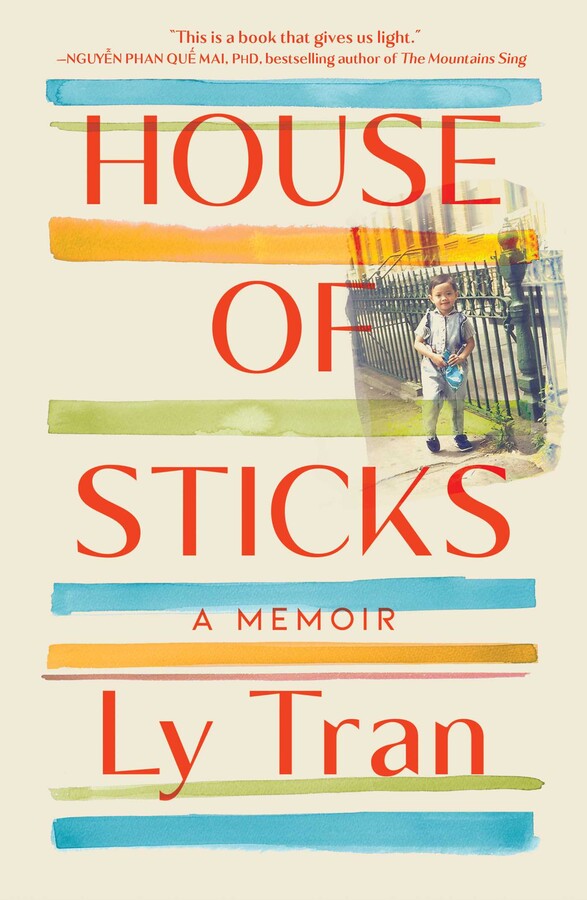House of Sticks
Written by Ly Tran
June 1, 2021
ISBN 9781501118814
Content note: This is a review of a memoir by a Southeast Asian author; the writer of this review is not of Southeast Asian heritage.
Vietnamese American writer Ly Tran’s debut House of Sticks is a sweepingly vivid memoir chronicling her experience growing up in America after her family moves from Vietnam in the early 1990s with the assistance of the U.S. government-run Humanitarian Operation resettlement program. Her six-person family–consisting of Tran, her three older brothers, and her mother and father–begin their new lives in a railroad apartment in Ridgewood, located in the New York City borough of Queens. This deeply personal work covers her years spanning from early childhood through early young adulthood and tackles the full spectrum of human emotions, as well as her personal experiences with poverty, mental health challenges, and language barriers, with Tran skillfully balancing moments of despair and vulnerability with humor and hope.
Not long after their arrival, the family’s apartment doubles as a sweatshop as her parents take on sewing cummerbunds and ties to earn a living, enlisting the help of the four children. After what Tran dubs the “Sweatshop Era” comes the “Nail Salon Era”; her mother begins working in nail salons, this time recruiting only Tran to work as both an apprentice and translator, requiring her to fulfill the often-distressing role of linguistic intermediary between her mother and customers who are occasionally disrespectful, sometimes even violent. On a personal note, as an East Asian person who was born and raised in the U.S. in middle-class comfort, it was humbling for me to learn of Tran’s childhood work experiences and the resulting stressors she faced on top of the demands of her own schoolwork.
Tran’s exploration of themes of otherness and the desire for belonging are rendered in anecdotes of immersive detail. Throughout her life, she is constantly subjected to botched pronunciations of her name, though in all instances she chooses not to correct these microaggressors: “I’m afraid to tell them they are wrong. I am more concerned with their comfort than my own.” One night when her mother brings home bottles of nail polish to practice her new craft, Tran looks through the bottles which are affixed with lighthearted, yet seemingly bourgeois names like “An Affair in Times Square.” Playfully, she conjures up new names that reflect her own lived experiences, such as “No Rice Grains Left Behind!”
In elementary school, she yearns for books and stationery items from the Scholastic catalog and is envious of her classmates who are able to purchase these types of goods. For her, the acquisition of objects such as stickers, erasers, or a Newbery Award winner is tangible proof of assimilation, though lack of funds and the philosophies of immateriality ingrained in her by her Buddhist parents prevent her from achieving this milestone.
Tran’s complex and, at times, fraught relationship with her father, who was imprisoned in a “reeducation camp” in their homeland, also serves as a focal point of the text. For example, when she begins to experience difficulties with her vision and requires glasses in elementary school, her father promptly dismisses the medical issue as merely a costly attempt of hers to fit in, telling her, “Just because all these American kids are wearing glasses doesn’t mean you have to.” Despite their differences, she paints a tender and sympathetic portrait of an immigrant father coping with his own personal traumas and the hardships of navigating a new culture in order to provide what he feels is best for his kin.
Early in the memoir Tran describes how her mother encouraged her and her siblings “never to rest before we had attained our goal, because anything short of completion didn’t count.” It seems that she kept that advice close to her heart as she has succeeded in bringing an extremely accomplished work to life. While the memoir has universal appeal, APALA readers who are passionate about education and the importance of nurturing students may feel particularly inspired by her journey.
Review by Amanda Cheung, editing assistance by Anastasia Chiu.
Book reviews and author interviews featured on APALAweb.org are reflective of the reviewer and interviewer only and are conducted separately from and independently of APALA and the APALA Literature Awards Committee and juries.

